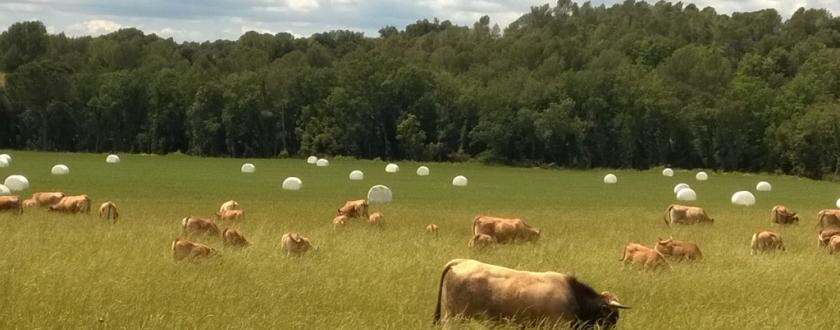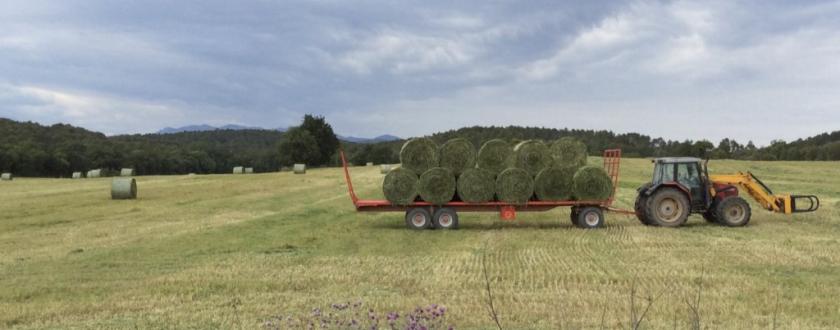Adapta Agroecología. Agroecology practices on Can Genover farm (Alt Ampordá - Girona)
Description of the case study
The Adapta Agroecología programme led by the Spanish Society of Organic Farming (SEAE) uses agroecological production and marketing practices to contribute to climate change adaptation in the agricultural sector. Can Genover farm (Vilanat, Alt Empordá) and its manager, the cattle farmer Marisa Reig, are a good example of how the farming and livestock sector can be adapted to the effects of climate change via a strategy which promotes quality, resilience and organic production.
Organic agriculture and livestock farming are sustainability-based models for food production and management of the region and its natural resources. This approach is now an opportunity to make progress in adapting agriculture to the effects of climate change. It supports knowledge of and respect for natural ecological processes with a view to increasing the resilience of estates/farms. It also promotes management and usage practices for land and water which respect the natural environment, and encourages landowners to maintain agrobiodiversity on their land.
Practices to improve biodiversity enable farms to imitate natural ecological processes and to better respond to the consequences of climate change. In that regard, farmers should monitor their agroecosystems closely and work regularly with other farmers to share information and learn.
Las prácticas que mejoran la biodiversidad permiten a las granjas imitar los procesos ecológicos naturales, lo que les permite responder mejor a los cambios que plantea el cambio climático. Para ello, los agricultores/as deben observar de cerca sus agroecosistemas y, a menudo, trabajar con otros agricultores/as para compartir información y aprender.
The overall objectives of the Adapta Agroecología programme are as follows:
- Promote joint processes for creating agroecology technology which involve researchers, advisers and producers and which strengthen the capacity of this last group to tackle the consequences of climate change and better adapt.
- Raise awareness among the different levels of society so that they adopt practices which facilitate climate change adaptation, such as consuming organic food.
The specific climate change adaptation objectives on Can Genover farm are as follows:
- Implement agroecological measures to improve crop management and reduce desertification and water scarcity.
- Select appropriate seeds to development pastures which are adapted to the characteristics of each environment and farm.
- Protect the region and conserve the traditional knowledge tied to its natural environment and specific features.
The solutions developed by Marisa Reig at Can Genover to adapt the farm to climate change are as follows:
- Farm with 160 head of Aubrac cattle, a breed well-adapted to the climate and the dry forests of Empordà.
- Extensive Voisin-style rational grazing (to graze exclusively from the estate via livestock management using electric fencing and own fertiliser).
- Agroecological management of the entire estate (265 ha) with crop rotation and minimal cultivation.
- Maintaining hedgerows and flower concentrations which increase the overall biodiversity on the estate.
- Collecting and using rainwater and run-off in ponds to create small aquatic ecosystems.
Case mainly developed and implemented via objectives from other non-adaptation policies, though with significant consideration for climate change adaptation aspects.
Spanish Society of Organic Farming, Biograssfed
Additional Information
The Adapta Agroecología project is led by the Spanish Society of Organic Farming in collaboration with 12 state-wide farms/estates which employ agroecology practices. The project has received funding from Fundación Biodiversidad, part of the Ministry for Ecological Transition.
Success: an organic farming community which is united and aware of the need to adapt to climate change; more resilient farms and farming techniques; farmers and livestock farmers are open to innovation; value added of organic produce facilitates quality management.
Limiting: fewer number of farms and hectares used for organic production in Spain, particularly in mountain livestock farming; end consumers have little knowledge of climate change adaptation practices beyond organic farming; low implementation of agri-environmental techniques on conventional farms.
The Adapta Agroecología project has been funded by Fundación Biodiversidad. Work by Can Genover farm does not receive any specific public funding.
The Adapta Agroecología project has received financial support in the form of grants from Fundación Biodiversidad (part of the Ministry for Ecological Transition) for climate change adaptation projects (2017).
In progress
Reference information
PYRENEAN CLIMATE CHANGE OBSERVATORY
Avenida Nuestra Señora de la Victoria, 8
22.700 - Jaca
Huesca - España
+34 974 36 31 00
info_opcc@ctp.org






